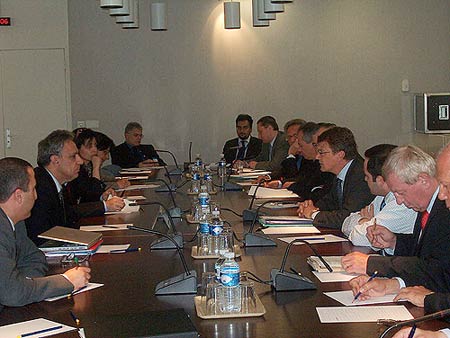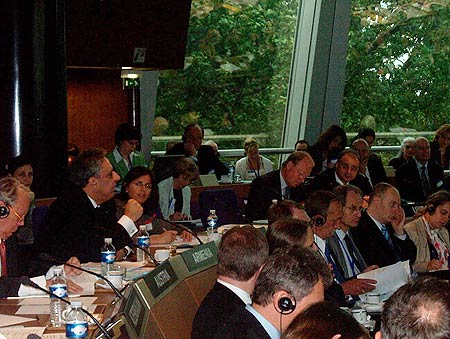Minister Oskanian Speaks in the 117th Session of the Council of Europe Committee of Ministers
11 May, 2007Minister Oskanian participated in the 117th Session of the Council of Europe Committee of Ministers. In his statement, Minister Oskanian recognized how Armenia has changed during the years since Council of Europe membership, as well as the evolution of the Council of Europe itself. He also referred to the major domestic and foreign policy issues -- the parliamentary elections and the resolution process of the Nagorno Karabakh conflict.
The Session, held in Strasbourg on May 11, 2007, included several agenda items, including closer cooperation between the Council of Europe and the European Union. This was the topic of a special meeting held a day earlier, during which Minister Oskanian’s intervention addressed the need for closer and more efficient institutional links between these two major European institutions.
In the margins of the Ministerial Meeting, Minister Oskanian met with the Council of Europe Commissioner for Human Rights, and discussed regional issues, as well as the Commissioner’s future visit to Armenia. He also held meetings with the Secretary of State of Spain, which currently holds the Chairmanship of the Organization for Security and Cooperation in Europe, as well as the Secretary of State of Sweden.

Minister Oskanian also met with the Council of Europe Monitoring Group, known as the Ago Group, and responded to questions on Armenia’s regional relations, and on the parliamentary elections. The Minister confirmed that he shared the Council of Europe’s strong interest in open and fair elections and looked forward to a favorable report by the OSCE ODIHR observation mission. Minister Oskanian also responded to the Ago Group’s question about the Nagorno Karabakh negotiation process.
Below is the text of the Minister’s statement:

Statement by
H. E. Mr. Vartan Oskanian Minister of Foreign Affairs
of Republic of Armenia At the 117th Session of the Committee of Ministers
Strasbourg
May 11, 2007
Mr. Chairman,
As I was heading to this hall this morning, it occurred to me that I haven’t missed a single Ministerial meeting since our membership in this organization. I also remember my first Council of Europe ministerial when I had been invited in the run-up to our membership, when I had tremendous difficulty finding a way to get to Strasbourg from Yerevan in time to deliver a speech and return that same evening. Those days we were still suffering from the consequences of the collapse of an era, which had also brought with it the collapse of our economic and transport connections to the world.
Yesterday, as I left to come to this meeting, I had a choice among 6 European carriers, and left a country that has been growing on average 12% a year. So survival is no longer a question. We, too, can now take survival for granted. That’s a luxury we didn’t used to have.
Indeed a lot has changed since the first days of our membership. The Council of Europe has evolved and grown and Armenia has changed greatly. Our economic growth is gratifying, it must become more distributed, must reach further into the rural communities and the sources of that growth must themselves become more refined and sophisticated. Our political allegiance to the values that define our era – the rights of the individual over the rights of the state, the rule of law over the rule of man, the path of compromise over the path of confrontation is also irreversible. These are values that Europe articulated and embraced.
Over this last half century, Europe has proven that not only are these ideals good ends in themselves, but they are the necessary means to stability and prosperity. We have understood that we don’t need to choose between human rights and development, but that one is a means to the other.
Over this last half century, the Council of Europe has changed. Membership has grown, the Court of Human Rights and the Commissioner of Human Rights have become solid institutions. Thus, with overlapping membership with the EU, and sometimes with overlapping processes, these two organizations are complementary. The Council of Europe is the organization where one hones these values, adapts them as tools to the conditions and demands of the day and place, perfects them, and makes it possible to take them, too, for granted. The European Union is the shop that turns these values into the instruments of reconciliation, prosperity and peace. Cooperation between these two institutions takes place by default. The decision is not whether to cooperate but, after the Juncker Report, the question is the depth, specificity and institutionalization of that cooperation. The best organizational minds must fashion mechanisms which are not self-serving, which do not compromise the integrity or capacity of these institutions, but enable them to meet the noble goals of creating and bolstering bonds between human beings that transcend older boundaries and make of these new institutional forms a functioning, productive, peaceful community of nations. This is why, today, we can proudly point to a memorandum of understanding between the Council of Europe and the EU, and why tomorrow, we must put our credibility and resources behind the San Marino chairmanship in making this memorandum a reality. I would also like to commend the Chairman for making intercultural and inter-religious dialogue a priority on the agenda of the Council of Europe this year. Armenia also attaches great significance to these issues.
Mr. Chairman,
I have frequently said from this podium that Council of Europe membership provided for Armenia a roadmap and a guidepost. It’s not enough to decide which direction to take, it’s important to choose the right path to get there. Our membership commitments pushed us along the path of reforms more quickly and more purposefully than we could have done ourselves, alone. Today, literally on the eve of parliamentary elections, we have a Constitution which better protects the rights of the individual citizen and better articulates the responsibilities of the government. These elections will be held under new conditions, new laws, new working mechanisms, all designed with the wisdom and experience of the Council of Europe and the Venice Commission, the OSCE, the European institutions, to encourage our citizens to suspend the decades of inbred cynicism and distrust, and believe in the power of their voice and their vote. The stakes are high. We hope that, next week, we will all be able to look at each other and say these elections are significantly better than any we’ve had. Thus, we will be well on our way towards the last of our Council of Europe commitments.
There is of course, Mr. Chairman, one commitment left which we made together with Azerbaijan, when we entered this organization – that we would achieve a peaceful, lasting resolution of the Nagorno Karabakh conflict. Judging purely from the content of the negotiating document and the nature of the principles included there, and the progress we’ve made on that document, we have hope that an agreement is possible. A major part of the progress comes from the fact that all involved have come to acknowledge and agree that at the end of the day, it’s the people of Nagorno Karabakh which should determine their future status through a referendum, and through the exercise of their right to self-determination.
But there are some factors which dampen our optimism. First, I worry that the content and spirit of the negotiations are not matched by the public statements that are regularly heard from the Azerbaijani leadership. Second, the endless Azerbaijani references to a possible military solution are counterproductive, not to say dangerous. Third, Azerbaijan’s actions do little to bolster confidence. On the contrary, intentional violence such as the organized destruction of Armenian cross stones in the Nakhijevan region of Azerbaijan serve to further sow distrust between our peoples.
Still, this is a basic document on principles that is a balanced, fair set of tradeoffs and we will continue to work on it.
Mr. Chairman,
Let me say thanks to you for San Marino’s leadership, and welcome Serbia to the presidency, and also congratulate Montenegro on their membership to this organization.
Thank you.

